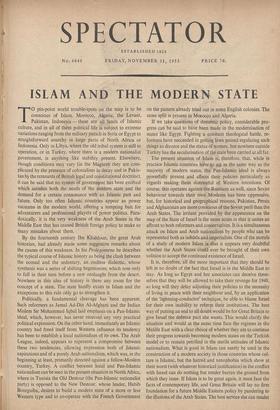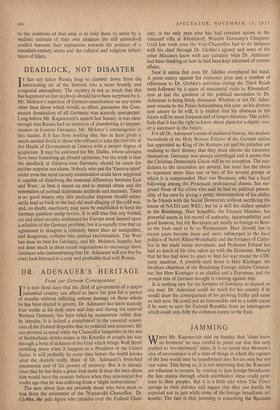ISLAM AND THE MODERN STATE
T0 pin-point world trouble-spots on the map is to be conscious of Islam. Morocco, Algeria, the Levant, Pakistan, Indonesia — these are all lands of Islamic culture, and in all of them political life is subject to extreme variations ranging from the military putsch in Syria or Egypt to straightforward anarchy in large parts of North Africa or Indonesia. Only in Libya, where the old tribal system is still in operation, or in Turkey, where there is a modern nationalist government, is anything like stability present. Elsewhere, though conditions may vary (in the Maghreb they are com- plicated by the presence of colonialism in decay and in Pakis- tan by the remnants of British legal and constitutional doctrine). it can be said that no system of government has been evolved which satisfies both the needs of the modern state and the demand for a certain consonance with an Islamic past and future. Only too often Islamic countries appear as power vacuums in the modern world, offering a tempting bait for adventurers and professional players of power 'politics. Para- doxically, it is the very weakness of the Arab States in the Middle East that has caused British foreign policy to make so many mistakes about them.
By the fourteenth century Ibn Khaldoun, the great Arab historian, had already made some suggestive remarks about the causes of this weakness. In his Prolegomena he describes the typical course of Islamic history as being the clash between the nomad and the sedentary, an. endless dialectic, whose synthesis was a series of shifting hegemonies, which rose only to fall in their turn before a new onslaught from the desert. Nowhere in this idea of history is there any room for the concept of a state. The state hardly exists in Islam and the exceptions to this rule only go to strengthen it.
Politically, a fundamental cleavage has been apparent. Such reformers as Jamal Ad-Din Al-Afghani and the Indian Mislem Sir Muhammad Iqbal laid emphasis on a Pan-Islamic ideal, which, however, has never received any very practical political expression. On the other hand, immediately an Islamic country had freed itself from Western influence its tendency has been to establish a local nationalism of its own. The Arab League, indeed, appears to represent a compromise between these two tendencies, allowing expression both of Islamic aspirations and of a purely Arab nationalism, which was, in the beginning at least, primarily directed against a fellow-Moslem country, Turkey. A conflict between local and Pan-Islamic nationalism can be seen in the present situation in North Africa, where in Tunisia the Old Destour (the Pan-Islamic nationalist party) is opposed to the New Destour, whose leader, Habib Bourguiba, desires to build a modern state of a more or less Western type and to co-operate with the French Government on the pattern already tried out in some English colonies. The same split is present in Morocco and Algeria.
If we take questions of domestic policy, considerable pro- gress can be said to have been Made in the modernisation of states like Egypt. Fighting a constant theological battle, re- formers have succeeded in getting laws passed regulating such things as divorce and the status of women, but nowhere outside Turkey has the secularisation of the state been carried at all far.
The present situation of Islam is, therefore, that, while ih practice Islamic countries have to aet in the same way as the majority of modern states, the Pan-Islamic ideal is always powerfully present and affects their policies particularly as regards making them distrustful of Western intentions. Of course, this operates against the Russians as well, since Soviet behaviour towards their own Moslems has been oppressive, but, for historical and geographical reasons, Pakistan, Persia and Afghanistan are more conscious of the Soviet peril than the Arab States. The irritant provided by the appearance on the map of the State of Israel is the more acute in that it unites an affront to both reformers and conservatives. It is a simultaneous attack on Islam and Arab nationalism by people who can be represented both as infidels and imperialists. One of the morals of a study of modern Islam is that it appears very doubtful whether the Arab States could ever be brought of their own volition to accept the continued existence of Israel.
It is, therefore, all the more important that they should be left in no doubt of the fact that Israel is in the Middle East to stay. As long as Egypt and her associates can deceive them- selves that they will be allowed to take their revenge for 1948, so long will they delay adjusting their policies to the necessity of living in peace with their neighbour and, by an application of the lightning-conductor' technique, be able to blame Israel for their own inability to reform their institutions. The best way of putting an end to all doubt would be for Great Britain to give Israel the defence pact she wants. This would clarify the situation and would at the same time face the regimes in the Middle East with a clear choice of whether they are to continue their progress towards becoming modern states on the Turkish model or to remain petrified in the sterile attitudes of Islamic nationalism. What is good in Islam can surely be used in the construction of a modern society in those countries whose cul- ture is Islamic, but the hatred and xenophobia which show at their worst (with whatever historical justification) in the conflict with Israel can do nothing but render barren the ground from which they issue. If Islam is to be great again, it must face the facts of contemporary life, and Great Britain will lay no firm foundation for a future Middle Eastern policy by pandering to the illusions of the Arab States. The best service she can render to the countries of that area is to help them to settle by a realistic estimate of their own situation the still unresolved conflict between their aspirations towards the position of a twentieth-century states and the cultural and religious inheri- tance of Islam.



































 Previous page
Previous page